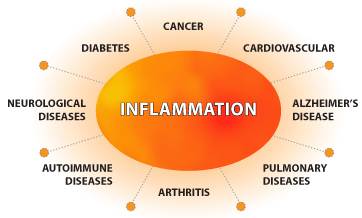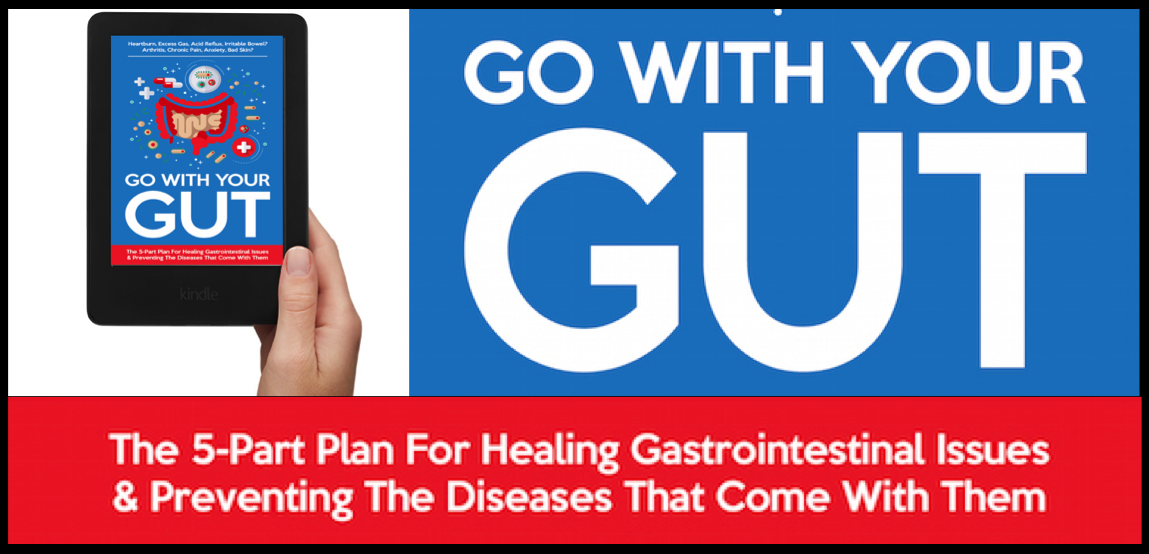Not all inflammation is bad; as the very reason our body has an inflammatory response is to protect and heal itself. Whether that’s swelling, warmth, and redness for an acute injury, or the secretion of T-cells to destroy harmful pathogens.
But chronic (or systemic) inflammation is bad. Since unlike burns, cuts, breaks, and bruises, or allergic reactions and infections, the response is frequent and consistent. Meaning a continuous flow of pro-inflammatory cytokines, ongoing fluid build-up in tissues, and an overall loss of proper function.

With ongoing inflammation the tissue clean-up crew basically loses it’s ability to regulate between what’s healthy, and what needs to be broken down or destroyed. Going to work on more than just the damage site, and chipping away at critical areas all over the body – arteries, cartilage, neurons, bone, epithelial tissue, beta cells, muscle, etc. And continuing their repair efforts until the initial source of the inflammation is removed.
As you may have guessed, this eventually turns into a chronic condition, like arthritis, psoriasis, or asthma, and a more serious degenerative one over time, like cognitive decline (dementia), atherosclerosis (heart disease), obesity (1, 2, 3), diabetes, depression (1, 2), and even cancer. Not only because of the damage from the inflammation itself, but because of the collateral damage that occurs as a result of the chronic and repetitive immune response. With the development of insulin resistance and obesity being some of the major drivers, but a damaged gut following closely behind (according to the most recent evidence). And sadly, helping explain some of the devastating autoimmune and neurological conditions added to the degenerative condition mix – inflammatory bowel disease, multiple sclerosis, type 1 diabetes.

Interestingly, it’s still debated what comes first, the insulin resistance and the inflammation; and similarly, the inflammation or the leaky gut. But one things that’s clear, is that they’re both present in the final disease state – whether we’re talking insulin resistance and inflammation (1, 2, 3, 4, 5, 6), or leaky gut and inflammation – and they both exacerbate one another with a diet and lifestyle that encourages their development.
MEANING, you have the ability to reduce your risk of these deteriorating conditions, by avoiding unnecessary inflammation. Whether that’s removing certain foods (grains) and prioritizing certain behaviors (sleep), or increasing certain foods (fish) and reducing certain behaviors (stress).
1. Remove Inflammatory Foods
Our body launches an immune response when an ingested threat is perceived, which is why eliminating inflammatory foods is critical. Sadly, many of us have become accustomed to eating an immunogenic food, like wheat, at every meal. Leaving an ongoing level of systemic inflammation that literally NEVER stops.
2. Keep Blood Sugar Down
Chronically elevated blood sugar (hyperglycemia) increases the likelihood of glycation (sugar binding to protein), which results in an inflammatory response and leads to cell damage – specifically in the brain! Furthermore, the development of insulin resistance increases inflammation (and visa versa); meaning chronically elevated blood sugar is a double whammy.

3. Avoid PUFA and hydrogenated vegetable oil (trans fats)
Polyunsaturated fatty acids (PUFAs) are a common food additive, in the form of soybean, canola, and sunflower oil. They’re not only high in pro-inflammatory omega-6 fats (1, 2), but they’re very unstable and prone to oxidation – the 3rd synergistic factor in the insulin resistance and inflammation connection. So, opt for saturated fats when cooking at home (coconut oil, butter, animal fat) and avoid PUFAs as much as possible when eating away from home.
4. Eat more fish or take fish oil
A large contributor to the chronic inflammation in the 21st century is an imbalance between our omega-6 to omega-3 ratio. Other than avoiding unnecessary omega-6 additives in the form of PUFA oils, you can transition to a more anti-inflammatory ratio by prioritizing omega-3 foods (like fish), or supplementing fish oil (1, 2, 3). The typical ratio of 20:1 today is nowhere close to our hunter gatherer ancestors that maintained a 1:1 or 2:1 ratio. Largely because they weren’t overconsuming vegetable oil, but also because they were consuming an average of 6-14g of long-chain omega-3’s (EPA/DHA) per day. Which is similar to the often studied Greenland Eskimos who had amazingly low incidence of diabetes and heart disease.

5. Prioritize sleep and improve sleep environment
The immune system is activated when a lack of sleep is perceived, which results in an inflammatory response. Our body releases an abundance of inflammatory cytokines (1, 2, 3), we oversecrete stress hormones (like cortisol), our immune system weakens, and other biomarkers for disease are elevated. We also experience a significant shift in hunger, satiation and glucose regulation, with 1 night of bad sleep mimicking full-blown insulin resistance and diabetes.
6. Walk or take part in low-intensity movement (at least 30 minutes per day)
The benefits of exercise should be pretty straightforward, given it’s positive impact on insulin sensitivity and body fat reduction. Although it can also be extremely effective for lowering cortisol (stress) and inflammation…IF it’s within a reasonable intensity, duration and frequency.
A daily walking regimen of > 30 minutes reduces inflammation significantly, and has a dramatic impact on brain health. Not only because of the activity itself, but because of the reduction in sitting and sedentary behavior.

7. Disconnect from technology (especially in the evening)
Urgent emails and blue-blasting technology is a stress inducer that should be avoided when it’s time to rest, recover, and regenerate. Staying connected to this environment at night not only exposes us to chronic stress and inflammation, but it wrecks our sleep.
8. Repair and support your gut
Whether inflammation increases gut permeability or gut permeability increases inflammation is debatable, but when foreign proteins gain access to our bloodstream our body launches an immune reaction and inflammation ensues regardless. Other than avoiding inflammatory, gut-damaging foods in the first place, our best protection is an adequate amount of good bacteria in the gastrointestinal system. Which means consuming fermented foods (or a probiotic), optimizing digestion, and avoiding microbiota-depleting medication (antacids, NSAIDs, antibiotics).
9. Deal with stress head-on (don’t let it linger)
As discussed at the beginning of this post, chronic inflammation is bad while acute inflammation is necessary – and it’s the same story with stress. Short and sweet is good (like it was before cars, computers and couches), so try to handle things immediately or improve your ability to tone it out until you can deal with it. Stress and inflammation go hand-in-hand, so a chronically stressed executive is chronically inflamed; no matter what he eats.
10. Avoid common nutrient deficiencies
The majority of the population is deficient in vitamin D (lack of sun) and magnesium (tough to acquire, easily depleted), and both are directly correlated with inflammation (1, 2, 3) and the diseases that come with it (1, 2). In both cases, supplementation is usually a requirement.

What’s refreshing is that most of these changes are quite simple and cost nothing. So, other than committing to them – which shouldn’t be a problem based on the fact that it WILL improve your life and lower your risk of a degenerative disease considerably – there’s no extra investment. Swapping your stress-inducing technology time for more sleep and movement, or your bagel and margarine for some eggs and butter, is simple.
…and it can save your life.
Stay Lean!
Coach Mike
RELATED ARTICLES:

